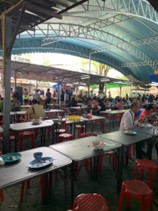As I wrap up the final weeks of my practicum with the Kenan Foundation Asia, I’ve also been reflecting on my time in Thailand and lessons I’ve learned from living in Bangkok.
My experience working with Kenan has taught me a lot about the unexpected challenges that public health workers face and how finding solutions for them isn’t always clear-cut. For example, during one weekend, my team visited one of the Burmese migrant communities living in Thailand (I was unfortunately out with COVID and devastated to have not been able to go) to get to know them and discuss potential sexual and reproductive health (SRH) interventions. The original plan had been to introduce SRH concepts through pamphlets or workshops, but upon meeting with the community, my team found out that some of the members were illiterate. Literacy was something we had never considered to be a potential challenge, and we had to modify some of the ideas we had to include activities that didn’t require literacy.
One of my deliverables was to write a recommendations report for how Kenan could communicate and disseminate SRH concepts and materials to the migrant and factory worker communities. After my team shared their experience from visiting the migrant community, I had to change some of my recommendations to be more equitable for all members of each community. One method I found while researching SRH education activities was an exercise called body-mapping, which consisted of participants each using a life-sized body diagram to label the anatomical body parts used in reproduction and sexual activities and answering questions pertaining to their beliefs and knowledge in SRH topics. This activity could be performed by the literate members writing down the labels and answers to the questions and illiterate members using an interpreter or discussion facilitator to explain their reasoning. I found body-mapping to be an interesting and unique approach to introducing communities to SRH topics because it allows public health practitioners to gain insight on the communities’ initial beliefs and potential misconceptions about SRH.
The deliverable that I am currently finishing is the creation of nutrition education modules for people across all life stages living in Thailand. I’ve included topics such as pregnancy nutrition, postpartum nutrition, infant nutrition, and child/adolescent nutrition. I first had to do research on what kinds of nutritional challenges Thailand was facing, which I found to be really interesting comparing Thailand to the U.S. and seeing how different food policies impact certain areas of nutritional health. For example, many of the packaged foods in Thailand do not have comprehensive nutritional labeling and often only provide information on the entire package rather than serving size. Thailand, along with other low and middle-income countries, is also currently experiencing a concept called the “double burden of malnutrition”, which occurs when there is a coexistence of undernutrition (stunting and wasting) and overnutrition (overweight/obesity). These issues all contribute to poor nutritional status, especially in children and pregnant people. Using the information I found from my research, I was able to tailor the modules to address specific nutrition concerns for people living in Thailand.
Through my practicum experience with the Kenan Foundation Asia, I began to truly enjoy research in nutrition policy and nutrition education dissemination. As an MPH student with a concentration in Nutrition, I am confident that the concepts I’ve learned while working on my deliverables will allow me to succeed in my future career in public health nutrition. I am particularly excited to delve deeper into nutrition policy in my Nutrition Policy class (NUTR 805) this fall semester.
Overall, my experience living and working in Bangkok has been extremely positive, and I’m immensely grateful for the opportunity and resources that helped bring me here. Bangkok is a city that is one-of-a-kind, with its diverse population, abundant street food options, and rich history. The people living here are exceptionally warm and will go out of their way to make you feel comfortable and welcomed. As I transition back to living in Carrboro, my heart will always have a soft spot for Thailand and the wonderful memories I made in Bangkok.
-Michelle Lee


